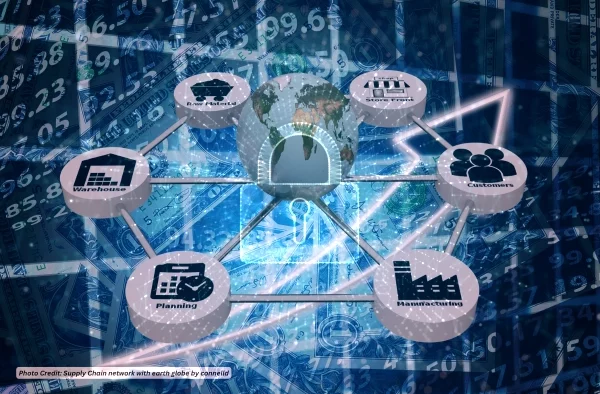Cybersecurity strengthens cyber supply chains
Share

As cybersecurity threats rise against Australia’s public sector, organisations must strengthen their risk management frameworks by addressing critical vulnerabilities in their cyber supply chains. Government agencies and public sector organisations in Australia face growing challenges regarding the integrity, privacy, and security of the data that third-party suppliers manage.
The rising dependence on advanced technologies, including artificial intelligence (AI), cloud storage, and data science solutions, particularly highlights this concern. Finding, evaluating, and reducing risks in the cyber supply chain are important for integrating these technologies into government systems. Authorities warn that ignoring these risks threatens data privacy and protection, compromising efforts to safeguard national infrastructure and essential data systems.
Identifying key supply chain risks
Identifying cyber supply chain risks serves as a crucial first step in tackling potential vulnerabilities in Australia’s public sector. Organisations increasingly adopt technologies like artificial intelligence (AI), cloud storage, and data science, which significantly increases the complexity and breadth of supply chain risks. Challenges arise from various elements, including external suppliers, contracted services, and the incorporation of international technologies.
Cyber supply chain poses several primary risks, including:
- Jurisdictional risks: Outsourcing is becoming more common, particularly to offshore locations, which raises concerns about the potential exposure of data to foreign laws and regulations, often without the awareness or approval of the contracting entity. Overseas locations may expose data to unauthorised access by governmental entities or malicious individuals operating in those areas. Sensitive government data faces alarming implications, especially as legal frameworks and government policies can shift unexpectedly.
- Supplier vulnerabilities: Vendors, including IT and OT equipment manufacturers, service providers, and software developers, pose significant risks when they fail to implement strong cyber security protocols. Organisations must evaluate the security measures of their suppliers to confirm that these partners are dedicated to upholding the integrity and privacy of the products and services they offer. Suppliers’ insufficient security measures can lead to data breaches, unauthorised access, or harmful codes entering the public sector’s systems.
- Counterfeit and fraudulent products: Counterfeit or substandard products in the supply chain challenge the integrity of system security. Products that intentionally alter data privacy and integrity or fail to meet essential security standards fall under this category. Public sector agencies must confirm the legitimacy of products and services, ensuring that only reliable and secure technologies enter their systems.
- Lack of Transparency and Security Commitments: Suppliers who do not provide clear information about their security measures or fail to demonstrate a consistent record of secure product delivery increase the risk of cyber vulnerabilities. Public sector organisations must ensure that their suppliers demonstrate robust cybersecurity practices, including relevant certifications, audits, and compliance measures.
Organisations must conduct comprehensive evaluations of cyber supply chain risks during the initial phases of procurement to identify these vulnerabilities. Assess the security protocols, governance frameworks, and privacy policies of prospective suppliers. Perform due diligence to ensure they comply with established best practices in cybersecurity. This proactive strategy ensures that we identify potential risks quickly, enabling us to take swift action to protect sensitive information and maintain smooth operations.
Assess supply chain vulnerabilities
Public-sector organisations must evaluate risks within the cyber supply chain to enhance their cybersecurity structures. This phase involves a thorough assessment of potential risks and weaknesses throughout the supply chain, particularly as companies increasingly rely on external suppliers, cloud solutions, and outside technologies. Given the essential role of artificial intelligence (AI), cloud storage, and data analytics in government operations, a comprehensive risk assessment must include various factors that could jeopardise data privacy, security, and integrity. A comprehensive evaluation of risks assesses the possible outcomes of a cyber incident or disruption in the supply chain.
Public-sector organisations must evaluate the impacts of compromised systems, data losses, or disruptions to critical services. Organisations must thoroughly examine the cybersecurity measures that their suppliers implement, especially those involved in critical infrastructure or managing sensitive information. Assessing a supplier’s security protocols is crucial for grasping the overall security position of the supply chain. Organisations must evaluate new and emerging risks consistently because the cybersecurity threat landscape is fast-changing.
Public sector organisations must stay vigilant about the latest cyber threats, especially those linked to advanced persistent threats (APTs), ransomware, and attacks on the supply chain. The Australian Cyber Security Centre (ACSC) states, “Assessing cyber supply chain risks requires a proactive and continuous approach. Risk assessments must not only consider technical and operational factors but also legal, financial, and reputational risks. Public sector organisations must be diligent in assessing both existing and potential suppliers to ensure that every link in the supply chain meets rigorous cybersecurity standards.”
Enhancing cyber resilience measures
To tackle cyber supply chain risks, organisations must implement a comprehensive strategy that integrates proactive and reactive measures while ensuring that public sector entities maintain robust cybersecurity and data privacy protocols. Organisations increasingly depend on third-party suppliers, cloud services, and innovative technologies, like artificial intelligence. They must take proactive steps to address vulnerabilities that could jeopardise sensitive information and critical infrastructure.
Public sector agencies must prioritise suppliers who demonstrate robust cybersecurity measures and operate with transparency to effectively address risks. It is crucial to collaborate with vendors who demonstrate a reliable dedication to safeguarding their products and services. Suppliers must demonstrate their cybersecurity measures, including encryption practices, secure data storage solutions, and robust network security systems. Reliable and thoroughly evaluated suppliers safeguard supply chains from the very beginning.
Prioritising cybersecurity and privacy
The Australian public sector increasingly prioritises cybersecurity and data privacy: it secures sensitive information, enhances service resilience, and upholds public trust. Governmental agencies increasingly rely on third-party suppliers, cloud-based services, and advanced technologies like artificial intelligence and data analytics, which significantly raises the risks associated with cyber supply chains. Executives and leaders must take prompt action in response to the changing landscape of threats. They need to develop strategies that safeguard the organisations and communities they serve.
Security threats in the public sector have escalated as organisations increasingly rely on external vendors. Cyberattacks have targeted supply chains, striking both private and public entities in Australia. These incidents highlight the weaknesses that arise from relying on external providers for essential infrastructure and services. Data privacy faces significant ramifications, as public sector organisations manage extensive volumes of personal, sensitive, and confidential information. A breach in the cyber supply chain can jeopardise the security of systems and the privacy of citizens’ data. Effectively managing risks within the cyber supply chain holds paramount significance.
Advanced technologies such as artificial intelligence, cloud storage, and data analytics are transforming the Australian public sector, highlighting the urgent need to manage cyber supply chain risks effectively. External suppliers, cloud services, and outsourcing technologies have extended the attack surface, putting organisations at risk for security breaches that threaten both cybersecurity and data privacy. Actively recognising, evaluating, and addressing these risks is essential for preserving sensitive information and upholding public service integrity.
Because of the big issues at hand, the public sector needs to create a thorough and long-term plan for cybersecurity that includes the whole supply chain, from the beginning stages of buying things and choosing vendors to the end stages of delivering services and shutting them down. Public sector leaders should prioritise establishing clear security standards, demanding transparency from suppliers, and ensuring all stakeholders are accountable for maintaining strong cybersecurity measures. Public sector organisations can safeguard essential systems by prioritising security, transparency, and accountability while also building public trust and confidence.
Public Spectrum is the first knowledge-sharing platform in Australia to embrace the entire public sector. This website is a platform where you can connect, collaborate, empower, inspire, and upskill with public sector professionals.


Today’s Pick
11th Annual Aus Goverment Data Summit
April 1, 2025
7th Annual NZ Government Data Summit
May 7, 2025
3rd Public Sector Comms Week
May 14, 2025
Subscribe
We send emails,
but we do not spam
Join our mailing list to be on the front lines of healthcare , get exclusive content, and promos.
AI analytics appointment Australia Australian boost boosts business businesses covid-19 cyber attack cybersecurity cyber security data data breach data management defence Digital employment enhance enhances fraud funding governance government grants infrastructure Innovation Lockdown management new zealand NSW NZ online privacy public Public Sector queensland renewable energy scams security Social Media Technology telecommunications victoria
-

Queensland advocates sustainable infrastructure development
Infrastructure, News
-

Set data in motion for dynamic, interactive citizen services
Data Management, Sponsored Story
-

Migrants not to blame for Australia’s housing crisis
Local Government, Opinion
-

Navigating the complexities of Australian visa applications
Digital Government, Local Government, Opinion
Show More-

Effects of ineffective communication in the workplace
Communications, Personal Development
-

7 ways you can enhance your personal development skills
News, Personal Development
-

5 advantages of working in the public sector
News, Personal Development, Professional Development
-

7 causes of communication issues in the workplace
Communications, News, Personal Development
Show MoreLast Viewed
Young Australians discover space career with Australian Space Discovery Centre
Privacy Awareness Week highlights privacy as the foundation of trust
New Zealand Government passes new whistleblower law
Territory’s Defence bases to be upgraded under $747 million investment
Defence launches advanced supercomputing capability